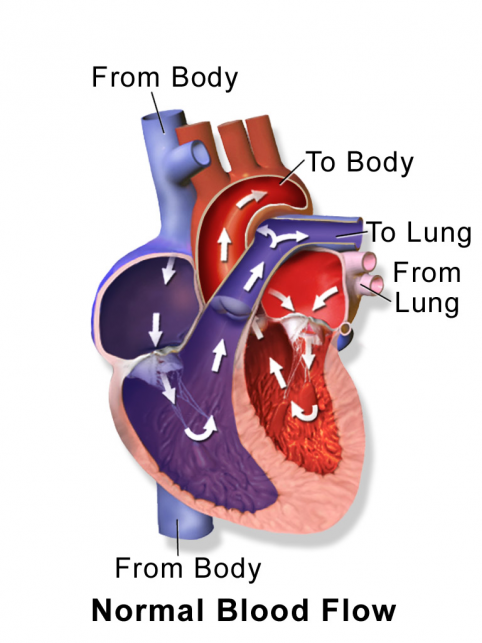Wishing everyone a safe and happy Christmas and New Year – Meri Kirihimete from the Healthify team.
Heart murmurs in adults
Key points about heart murmurs in adults
- A heart murmur is a whooshing or humming sound made when your blood travels through your heart.
- It may be normal – the normal blood flow being heard along with the typical lub-dub sound your heart makes. However, it may be a sign that your heart, or part of it, isn't working properly.
- Some murmurs are harmless (called innocent murmurs), but if you have a heart murmur due to a problem you may experience symptoms such as tiredness, shortness of breath, leg swelling and chest pain.
- Treatment may not be needed but could include taking medicines or having surgery. It depends on the cause and how bad your symptoms are.

The image below shows the pathway your blood takes through your heart. It travels from your lungs where it has picked up oxygen from breathing (oxygenated blood), through your heart to be pumped to the rest of your body. There it gives up oxygen to your tissues (becomes deoxygenated blood) and then goes back through your heart to your lungs to pick up more oxygen.
Your heart valves close behind the flow of blood, stopping it from flowing backwards through your heart. When you listen to a typical heartbeat with a stethoscope you can hear the heart valves closing making a ‘lub-dub, lub-dub’ sound.
 Image credit: Medical gallery of Blausen Medical 2014(external link)
Image credit: Medical gallery of Blausen Medical 2014(external link)
If the blood flow through your heart is fast, uneven (known as turbulent) or in the wrong direction (eg, backwards through a leaky valve), it causes an extra whooshing or humming sound that’s known as a heart murmur. The sound of a murmur is different depending on whether it happens when your heart is relaxing to fill up with blood (diastolic murmur) or when it’s contracting to pump blood around the body and lungs (systolic murmur). Sometimes you can have a continuous murmur if it can be heard all the time.
Heart murmurs can be harmless and nothing to worry about (known as innocent). This is generally when the normal flow of blood through your heart can be heard. However, a heart murmur may be a sign that something is wrong with your heart – especially if you have symptoms suggesting it’s not working properly (see the symptoms section below).
Some people are born with a heart murmur (known as congenital) or it may develop later (known as acquired).
In adults, a heart murmur may be caused by:
- A congenital heart condition (if you were born with it) where the heart and blood vessels don’t grow properly.
- Long-term effects of rheumatic fever, a serious complication of strep throat, causing heart valve problems.
- Pregnancy, probably due to an increase in the amount of blood flowing through your heart.
- Anaemia affecting the thickness of your blood.
- Overactive thyroid which can increase your heart rate.
- Extreme physical exercise putting stress on your heart and making it beat abnormally
- A fever raising your body temperature and your heart rate.
- A heart attack causing damage to the heart tissue.
- Infection of the heart valves affecting how they work.
- Stiffening of the heart valves making them narrow or unable to close properly (known as valve stenosis).
- High blood pressure if it’s not treated.
- Other rarer causes.
Not necessarily, if your heart murmur is harmless then you may not know you have it.
If your heart murmur is caused by your heart not working properly you may have symptoms. They will be different depending on the cause of the murmur, but may include:
- shortness of breath
- signs of poor circulation, eg, blue or grey lips or fingernails
- problems with doing your usual activities or exercising
- heavy sweating when you’re not being very active
- feeling extremely tired
- coughing
- chest pain or angina
- palpitations, eg, feeling your heart beat faster or irregularly
- feeling faint or fainting
- swelling (eg, your ankles) or sudden weight gain.
Your healthcare provider may hear a heart murmur during a routine physical examination, or when your heart is being listened to for another reason. They will use a stethoscope to listen to different parts of your chest (and maybe your back and neck) to find out:
- where it is
- what it sounds like (the pitch, and whether it changes when you change position)
- how loud it is
- the timing of the murmur in relation to your heartbeat.
They will talk to you about any symptoms you might be having, and whether they’ve got worse or if they change with different activities. They’ll also ask about your medical history, specifically if you’ve had rheumatic fever, and if you have any whānau members with a heart murmur.
If your healthcare provider wants more information they may send you for tests. These could include:
- a blood test
- a chest X-ray
- an echocardiogram
- an electrocardiogram (ECG).
You may also be seen by a heart specialist (cardiologist).
You don't need any treatment or monitoring for an innocent heart murmur.
For other murmurs, you may not need any treatment but will be monitored in case there are any changes over time. If you know you have a heart murmur and you begin to experience any of the symptoms listed above, talk to your healthcare provider.
If you do need treatment, it will depend on the cause and severity of your heart murmur. Treatment could include taking medicines (eg, to manage high blood pressure or your heart rate, to help your body get rid of excess fluid, or to thin your blood) or having surgery. Your healthcare team will discuss your options with you.
You can read stories about New Zealanders with heart murmurs(external link) on the Heart Foundation NZ site.
References
- Heart murmurs(external link) Mayo Clinic, US, 2022
- What is a heart murmur?(external link) Heart Foundation, NZ
- Heart murmur(external link) Better Health Victoria, Australia
- Heart murmurs(external link) British Heart Foundation, UK
Credits: Healthify editorial team. Healthify is brought to you by Health Navigator Charitable Trust.
Reviewed by: Dr Helen Liley, GP Liaison Counties Manukau
Last reviewed:





